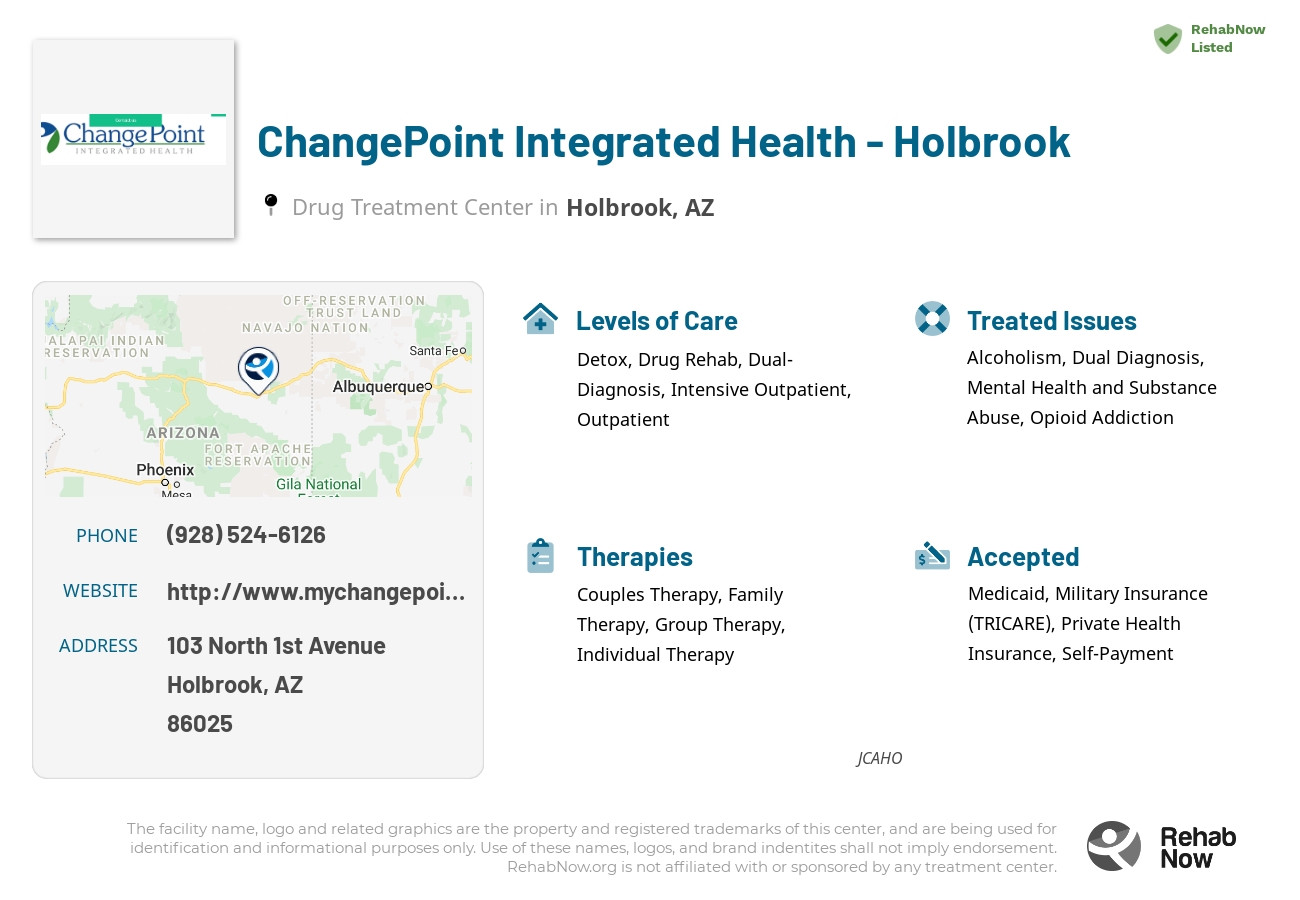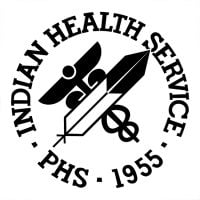ChangePoint Integrated Health - Holbrook
Drug Rehab Center in Holbrook, Arizona
ChangePoint Integrated Health - Holbrook offers a comprehensive range of drug rehab services, including detoxification, inpatient and outpatient programs, and dual-diagnosis treatment, tailored to meet the needs of individuals suffering from substance abuse and mental health issues, all while accepting most private health insurance plans.
About ChangePoint Integrated Health - Holbrook in Arizona
ChangePoint Integrated Health in Holbrook, Arizona, stands out as a comprehensive facility focused on drug and alcohol rehabilitation. It's known for its intensive outpatient program, outpatient counseling, medication-assisted treatment, and court-ordered services, aiming to inspire change and empower clients towards recovery.
- Offers medication-assisted treatment, including Suboxone, to help manage opioid addiction symptoms and cravings.
- Provides both group and individual counseling as the core of its treatment approach, tailored to encourage personal growth and recovery.
- Accredited by the Joint Commission and licensed by the Arizona Department of Health Services, highlighting its commitment to high-quality care.
ChangePoint Integrated Health - Holbrook caters to individuals struggling with various addictions, offering specialized treatment methods such as psychiatric care, medication management, and individualized treatment plans. Their approach combines medical services with behavioral health support to address the complexities of addiction.
The facility treats a range of substance abuse issues and supports recovery through intensive outpatient and outpatient sessions, utilizing a mix of therapy, medication management, and 12-step programs to foster lasting change and personal development.
Genders
Ages
Modality
Additional
Accreditations
SAMHSA

JCAHO

CARF
The Commission on Accreditation of Rehabilitation Facilities (CARF) is a non-profit organization that specifically accredits rehab organizations. Founded in 1966, CARF's, mission is to help service providers like rehab facilities maintain high standards of care.
Conditions and Issues Treated
Substance abuse is the excessive use of any drug. This includes alcohol, medications, and illegal drugs. Substance abuse is treated with a combination of physical and mental treatments. Patients detox and follow up with therapies that target the underlying cause of the addiction. Substance abuse is a severe problem that can be successfully treated with a variety of therapies. ChangePoint Integrated Health - Holbrook treatment uses a combination of therapies along with other resources to overcome substance abuse.
Opioid addiction treatment should be done in a medically supervised drug rehab. While taking opioids, users will typically use other substances to enhance the effects of opioids or to reduce the adverse effects of opioid use. Opioid addiction treatment will include detoxification and drug rehab counseling to help both the user and their loved ones learn how to live a successful sober lifestyle.
Treatments such as methadone, buprenorphine, and naltrexone are three medications that can help treat opioid addiction. These drugs work on the brain’s pleasure center and reduce cravings and the effects of illicit opioids such as heroin. These drugs can be either given orally or by injection. Individual drug rehab counseling sessions can be helpful to discuss any questions or concerns with the drug treatment program. This counseling will also help the user set goals for when they finish drug rehab.
Opioid addiction recovery is a long process. Many of the changes to the brain caused by opioid use cannot be undone, but with time and the proper treatment, a person can return to normal function. After detox, treatment will include drug rehab counseling and entering a halfway house or sober living community. Aftercare is critical to long-term recovery, as it helps the user avoid relapsing and entering back into drug rehab.
Levels of Care Offered
This center offers a variety of custom treatment tailored to individual recovery. Currently available are Detox, Drug Rehab, Dual-Diagnosis, Intensive Outpatient, Outpatient, with additional therapies available as listed below.
An addict may have to go through alcohol or drug withdrawal. While detox may be uncomfortable, it is not life-threatening. Detoxification allows the addict to rid the body of all traces of drugs or alcohol and gives the addict a clean slate for their recovery. In an inpatient or outpatient setting, detox can be managed medically.
Intensive outpatient treatment is a type of comprehensive addiction care. Unlike conventional residential treatment programs, the patients live at home during the recovery process. This means that one can continue working and caring for their families. These also allow people to keep pursuing their studies while also working on their sobriety.
Outpatient treatment can help one transition to normal life from the round-the-clock supervision and treatment available during inpatient treatment. It is an excellent tool to ensure long-term recovery. However, it is essential to note that intensive outpatient treatment in itself does not remove patients from the real-world setting. This means there’s always a higher risk of coming across environmental triggers. To further prevent relapse, an outpatient treatment center should be able to provide ongoing support services.
Once the patient is enrolled in an intensive outpatient treatment program, they will be expected to attend therapy and group meetings daily for a stipulated period. The frequency and duration of each session will depend on the patient’s needs and level of addiction. This can help curb the habit and deal with underlying issues that led to it. Most of these professional treatments are designed to allow patients to structure their daily schedules in a way that is conducive to recovery.
“Outpatient treatment is ideal for those who have a lower intensity addiction. It’s also suitable for those with a supportive environment and those on a tight budget.
Outpatient treatment can be considered the lowest intensity level of addiction treatment. It is ideal for early phase addiction or lower intensity addictions. It may involve weekly sessions instead of daily. Peer group support, 12-step programs, and individual counseling may still be used and anti-addiction medication.
Therapies & Programs
No single treatment works for all addicts; therefore, the goal of treatment and therapy should be to find what works best for each individual. Some people requiring addiction treatment may only need a few weeks of inpatient care. Others will require long-term residential care. Tolerance and withdrawal levels vary from person to person and thus affect the intensity of the treatment needed.
If an individualized approach to treatment and therapy is not offered, addicts may fail to reap benefits from their efforts. Professionals must customize plans according to their patient’s needs, limitations, and strengths. The goal of all forms of addiction treatment should be for addicts to find healthy ways to cope with their addiction and its underlying causes.
Couples therapy for drug addiction is a unique form of therapy that allows family members to work through the emotional issues of their loved one’s addiction together. Family members can support each other while learning how to cope with the addiction and encourage healthy changes.
Accordingly, couples therapy for drug addiction is designed for an addict and their significant other or spouse. The two will work with a therapist to learn how the addiction affects themselves and the relationship and how to break the negative patterns of behavior that may have developed.
Drug addiction can destroy a person’s life, as well as their family and friends. The loss of one’s ability to choose how to live and behave often leads the addict into depression, anger, guilt, and many emotional problems.
The therapies usually include siblings, children, and parents who are involved in their daily lives. These sessions are vital because they address past issues that may have hampered an addict’s or alcoholic’s recovery and provide support at a crucial time!
One of the most critical aspects of family therapy is helping addicts’ loved ones see their situation in a new light. It’s also one of the most challenging things a family can do when a loved one struggles with addiction or alcoholism.
Group therapy is held in a safe, controlled setting where patients can feel comfortable sharing their struggles and gaining perspective through shared conversations. It takes place in a group rather than one on one to prevent feelings of isolation or being unique in their situation while creating an environment for addicts at ChangePoint Integrated Health - Holbrook to develop fellowship, accountability, and support. Group therapy is an important tool in recovery that prevents cravings that prompt a return to active addiction.
This type of therapy involves the use of a variety of therapeutic techniques to help addicts recover from past traumas that might have triggered their substance abuse. During these sessions, therapists will work with the addict to address painful memories and learn how to cope effectively with stressors as they arise.
During these types of sessions, therapists will typically focus on three main goals:
- Identifying and expressing painful emotions associated with past traumas.
- Reducing the effects of stress on an addict’s life by developing more effective coping mechanisms.
- Developing healthy ways of thinking about stressful situations that can help addicts avoid substance abuse issues in the future.
This type of therapy is typically used in conjunction with other types of addiction treatment services. By identifying and dealing with the root cause of addiction, most addicts can overcome their cravings and prevent relapse once they leave rehab.
Many different types of addiction treatment services exist to help addicts safely get sober, but it’s important for recovering individuals to find a therapist or support group that will help them address the root cause of their addiction.
Life skills training is beneficial for addicts in recovery because it helps them learn how to take care of themselves and improve their quality of life, which can promote feelings of purpose and motivation.
This type of treatment works by teaching individuals life-enhancing skills that support positive living, including:
- Healthy lifestyle habits
- Skills to effectively manage stress
- Effective communication skills to help them get their needs met without turning to drugs or alcohol
- Money management and budgeting skills so they can continue to take care of themselves after treatment ends.
Payment Options Accepted
For specific insurance or payment methods please contact us.
Is your insurance accepted?
Ask an expert, call (888) 674-0062
ChangePoint Integrated Health Associated Centers
Discover treatment facilities under the same provider.
- ChangePoint Integrated Health - Show Low in Show Low, AZ
- ChangePoint Integrated Health - Psychiatric Hospital in Lakeside, AZ
- ChangePoint Integrated Health - Snowflake in Snowflake, AZ
- ChangePoint Integrated Health - Winslow in Winslow, AZ
Learn More About ChangePoint Integrated Health Centers
Additional Details
Specifics, location, and helpful extra information.
Holbrook, Arizona 86025 Phone Number(928) 524-6126 Meta DetailsUpdated April 15, 2024
Staff Verified
ChangePoint Integrated Health - Holbrook Patient Reviews
There are no reviews yet. Be the first one to write one.
Holbrook, Arizona Addiction Information
Arizona has some of the highest rates of prescription drug abuse in the United States. Methamphetamines, heroin and morphine are among the most commonly abused substances. Prescription pain relievers were prescribed to 348 million people in 2012, enough to medicate every adult in Arizona for 2 full weeks. The number of people with substance use disorders in Arizona has remained relatively constant over the past few years.
In Holbrook, Arizona, a survey conducted in 2018 showed that 5.3% of residents had used illicit drugs. Adolescents are particularly at risk, as 26.1% of Holbrook, high school students reported being involved in illegal drug activities on school property. The most common drugs involved in overdoses were methamphetamine, heroin, and alcohol. Few different types of treatment options available for getting sober in Holbrook include inpatient rehab, outpatient rehab, and 12-step programs.
Treatment in Nearby Cities
- Page, AZ (156.1 mi.)
- Kearny, AZ (136.1 mi.)
- Parker, AZ (241.7 mi.)
- Sun City West, AZ (152.5 mi.)
- Nogales, AZ (251.8 mi.)
Centers near ChangePoint Integrated Health - Holbrook
The facility name, logo and brand are the property and registered trademarks of ChangePoint Integrated Health - Holbrook, and are being used for identification and informational purposes only. Use of these names, logos and brands shall not imply endorsement. RehabNow.org is not affiliated with or sponsored by ChangePoint Integrated Health - Holbrook.






